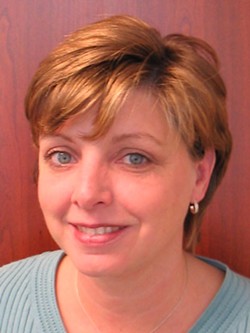Rick Koca spent 30 years witnessing how his country could help children around the world. As a career Navy man, he volunteered in orphanages. He built schools. So when he retired to San Diego, CA, the sight of children wandering the streets shocked him. "It really pained me," Koca said. "I just couldn't believe that in our own country, more than a million kids were homeless and street kids. I thought I should do something."
Today, the organization he founded, Stand Up For Kids, helps homeless youth in 20 states. Its volunteers work the streets, handing out information and supplies to street kids who may need anything from food to a phone card or even just to hear the sound of a friendly, trustworthy adult voice.
Now the group is planning a Charlotte chapter, adding to its network of 37 cities. The question is, how much is it needed? Before Stand Up For Kids starts up in a city, it surveys the city to determine what's needed. Are there shelters? Are there volunteers on the streets? Can street kids get health care? And how many homeless teens are there?
The answer to the latter question is elusive, of course. Nationally, as many as 12 percent of the homeless population are children living without parents or guardians, according to a study by the Urban Institute. The National Alliance to End Homelessness says about 5 to 7 percent of youth -- or 1 million to 1.6 million children and teens per year -- find themselves without housing at some point.
For Charlotte, one of the best measurements available might be the number of children who seek shelter at The Relatives, a shelter in Dilworth for youth ages 7 to 17. It's the main resource in Charlotte for runaways and homeless kids without their parents -- the next closest is in Belmont. The Relatives serves more than 400 people each year, providing housing and other help, said executive director Brennon Graham. In 2005, 93 young people were turned away because the 9-bed residence lacked room.
But many more children became homeless with their families. Last school year, the number of children classified as homeless increased 29 percent to 1,841 in May, said Annabelle Suddreth, executive director of A Child's Place, an independent nonprofit which helps homeless CMS students. Enrollment at a handful of elementary schools is nearly 10 percent homeless. At Walter G. Byers Elementary, more than 21 percent of students last May were considered homeless. Among high schools, West Charlotte High had the highest rate of homeless students with 2 percent.
Those figures likely don't include everybody -- some parents, out of pride, may be reluctant to identify their children as homeless; runaways may want to pass unnoticed by adults. Still harder to determine is how many of those children are actually on the streets -- federal definitions of homelessness encompass people living in shelters or doubled up in apartments or houses with other families.
Suddreth said A Child's Place doesn't often come across runaways or street children. Dale Mullenix, executive director of Urban Ministry Center, said that although he sees an occasionally homeless youth who's aged out of foster care, he hasn't seen many street kids in Charlotte. "Typically, we would be a place where, if there was such a group, they would show up: We have a free lunch; we don't ask questions," Mullenix said.
Regardless of the exact figure, Graham said Charlotte definitely has a homeless youth problem that can use more help. "It's a problem that a lot of people in the community aren't really aware of," he said. "Our street youth, I don't want to say they're hidden, but they're here and you don't realize it until late at night when there's some problems going on."
Most Stand Up for Kids chapters started through the advocacy of someone in their communities. In Charlotte, of course, it's a financial institution that's pushing the cause: Babson Capital agreed to give $80,000 if Stand Up for Kids started groups in Springfield, MA, and Charlotte -- cities where the company had headquarters. Erik Christensen, an Atlanta-based trainer for Stand Up for Kids and one of the group's few paid staff members, said volunteers now are surveying Charlotte to find out what shelters, clinics and agencies are available to help homeless youth. Said Koca: "We don't create all of those things. Our whole program is meant to get into the gutters, the sewers, abandoned buildings and the riverbeds or whatever and look for kids and direct them to services that are currently available."
Many street kids are homeless because they fled physical or sexual abuse; others leave home because of issues related to sexuality, Christensen said. As many as 25 to 40 percent identify themselves as gay, lesbian or transgender, according to surveys.
"Young people aren't running away because they're bad," Christensen said. "They're running away because at the time it looks like the best alternative. Or they're being thrown away ... or there's really no home to be in."
Speaking of 5.00000
-
A Family Affair
Dec 12, 2007 -

What If the Water Runs Out?
Dec 12, 2007 -
Body Talk
Dec 12, 2007 - More »
Latest in News Feature
More by Karen Shugart
-
Mecklenburg and beyond ...
Feb 10, 2009 -
Mecklenburg and beyond ...
Feb 9, 2009 -
Mecklenburg and beyond ...
Feb 6, 2009 - More »
Calendar
-

NEW WINDOW GALLERY-Pat Rhea-ACRYLIC PAINTINGS-April 05-30 2024 VALDESE, NC 28690 @ New Window Gallery/Play It Again Records
- Through April 30, 12 p.m.
-

TheDiscountCodes
-

"Blood Residue Analysis of Paleoamerican Stone Tools in the Carolinas" @ Native American Studies Center
- Fri., April 26, 12-1 p.m.
-

Brightfire Music and Arts Festival @ GreenLife Family Farms
-

ARTS RENAISSANCE, a GALA supporting the ARTS in South Carolina @ the Columbia Museum of ART
-
5 Online Player Communities to Join in Michigan
-
A beginners guide to online sports betting in the US
-
I Changed my Sex. Now What?
Scott Turner Schofield's rapid transit to a new identity










